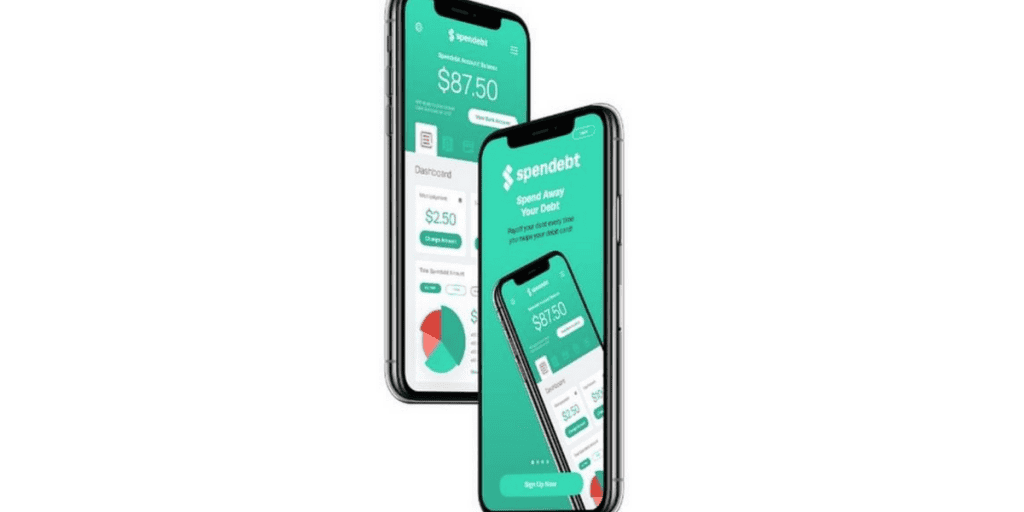
Kiley and Ty’Lisha Summers once found themselves nearly $100,000 in debt; now, they have a goal of owning a $100 million company. The Houston-based couple used their own experience of paying down consumer debt to launch SpenDebt, a SaaS payment solution chosen for the Mastercard Start Path program.
You could say debt is ubiquitous in the United States. A 2015 report by The Pew Charitable Trusts found that 80 percent of American households have some form of debt. “As we started sharing our story, we realized that there were so many people who were just like us but didn’t know what to do,” explains Ty’Lisha, co-founder of SpenDebt.
SpenDebt’s model relies on the simple truth: everyone spends money. The company, which is available as a phone app or web service, securely links to the user’s bank account and allows you to designate a predetermined micropayment to be deducted at every transaction. The micropayments are then applied monthly to the debt of the user’s choice, whether it be lofty student loans or a monthly car payment.
“God gave my husband the vision to start SpenDebt to help people help themselves,” she says. Kiley even decided to share his concept Mastercard, but the idea was too early to gain anything other than the corporation’s intrigue.
After two years of development and a subsequent year of beta testing, SpenDebt launched its commercialized product in 2019. The Summers applied to Mastercard Start Path, a highly competitive startup engagement program multiple times before being accepted into its 2021 cohort of six scaling startups.
“To finally get the ‘yes,’ it just made it full circle,” says Ty’Lisha. “It’s a game changer for SpenDebt.”
Fintech is a multibillion-dollar industry, and financial apps have become the darlings of venture capitalism. According to a SpenDebt release, companies that have participated in Start Path have gone on to raise more than $3 billion in post-program capital. Even while investor budgets were trimmed during the pandemic, Fintech companies garnered $44 billion in investments — a 14 percent increase since 2019, reports Finextra.
From the New Statesman to the Raconteur, media outlets and pundits have explored the saturation of the fintech sector. Ty’Lisha is confident that SpenDebt is different from its competitors.
“What’s unique is that we give our customers 100 percent control on defining what that micropayment is, unlike our competition where it is strictly just round-up,” she explains. The average SpenDebt user has set a $1.70 micropayment, but the co-founders have seen payments set at anything from 50 cents to $25 per transaction.
Initiatives like Bank of America’s Keep the Change rounds up each transaction to the nearest dollar amount, then puts that money into a savings account for you to pay your debt off — or not. McKinsey & Company survey reports that more than 50 percent of US consumers expect to spend extra as COVID-19 restrictions relax, with higher-income millennials intending to spend the most. According to CNBC, Gen Z shoppers are also predicted to spend big on niceties like clothing and travel.
Though no app can automate personal discipline, SpenDebt can help you pay down debt and build financial literacy.
“With SpenDebt, once you tell us where you want that payment to go, that’s where it’s going,” explains Ty’Lisha. When the micropayments are deducted from your account, SpenDebt holds onto your accrued payments and sends them monthly to the creditor of your choice. Ty’Lisha notes the service can be canceled or put on hold.
NBC News reported that 46 percent of Americans wiped out their emergency funds in 2020 as they shuffled to make ends meet. States around the country, including Texas, even enacted moratoriums on utility shut-offs in response to the pandemic. In some industries, “businesses went from collecting full payments from people to not collecting anything” or accepting partial payments, she explains.
The pandemic highlighted an opportunity for SpenDebt to partner with enterprises to offer creative solutions for payments that help customers pay off existing debt while helping businesses collect “something versus nothing.”
As SpenDebt includes enterprises in its long-term growth strategy, the company founders have also pledged to work with nonprofits.
For the Summerses, SpenDebt’s mission surpasses their desire to live a debt-free life. “As a part of our debt-free journey, we couldn’t help but become more well-versed in finances. We were on a quest to make our money work for us versus the other way around,” shares Ty’Lisha.
As Black business owners, Kiley and Ty’Lisha want to focus on building generational wealth for their family’s future and help SpenDebt users do the same. “We like to say that we want all of the generational curses that may have been passed down to us to stop with us, and to start creating generational wealth for our future,” she explains.
“[Debt] doesn’t just address the middle class; there are so many people across the spectrum in debt,” says Ty’Lisha. “A lot of times, the low-to-moderate income communities get overlooked,” she continues.
SpenDebt is a preferred partner of United Way of Greater Houston and recently penned a partnership with Impact Hub Houston — an incubator with a mission to empower entrepreneurs and small businesses to take on issues like sustainability, gender equality, and economic growth.
SpenDebt hopes to capture its first enterprise customer during its six-month StartPath program and hopes to one day become a $100 billion company. “The resources, the network, the knowledge that we’re getting from Mastercard and their network, the exposure that we’re getting—it’s going to be huge,” says Ty’Lisha.
Of the many goals for SpenDebt’s future, she wants the company to be “a solution for communities that may have been overlooked.”
